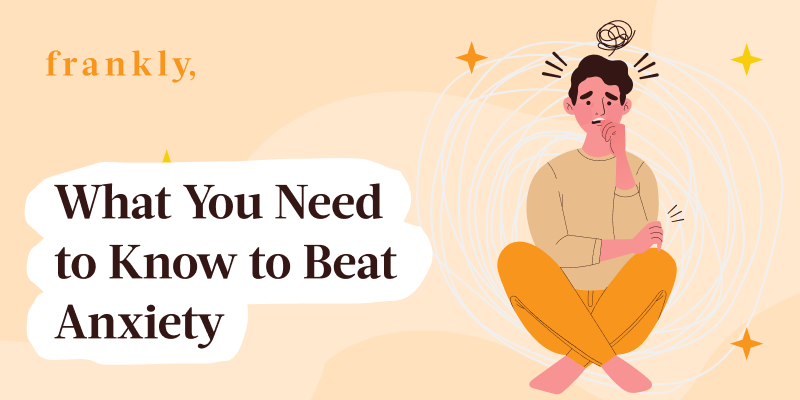What You Need to Know to Beat Anxiety

Anxiety can be healthy, until it’s not. When anxiety is out of proportion to your circumstances, it may negatively impact your life. Butterflies are normal, but a racing heart and almost passing out at the grocery store aren’t.
People who have anxiety disorders often experience intense, excessive, and repeated worry and fear in everyday situations. This can take the form of restlessness, nervousness, panic, and many other symptoms in your body, which we’ll outline in more detail below.
If you’re experiencing anxiety, you’re not alone. Anxiety disorders are actually the most common mental health issue in the US, and affect 40 million or more adults every year. Yet over 50% of adults with Generalized Anxiety Disorder are not receiving any treatment.
Untreated anxiety can have a substantial impact on your personal and professional life. Researchers have found that people with an anxiety disorder are 3-5x more likely to see a doctor, and 6x more likely to be hospitalized for other psychiatric disorders than those who do not suffer from anxiety disorders. If you experience fear, worry, or anxiety that’s upsetting you, then you deserve real solutions.

How to recognize the signs of anxiety
Anxiety can manifest differently for different people. While anxiety is often broadly defined as fear, worry, and nervousness, there’s a lot more to it. For example, in a triggering situation, you may find yourself going to the bathroom 12 times in 2 hours. Or, you might feel flushed, light-headed, dissociated, like your mind won’t stop, have trouble eating or keeping down food—or none of these may apply for you.
There’s a complex relationship between mind and body. Because your body is affected by anxiety via stress hormones like cortisol, the symptoms you experience can manifest across your cardiovascular system, gastrointestinal system, and other areas of the body.
Below is a list of general symptoms of anxiety. You may also be experiencing symptoms not on this list—that’s part of why it’s important to seek assistance from a qualified professional.
Symptoms of anxiety:
- Feeling nervous, restless or tense
- Having a sense of impending danger, panic or doom
- Having an increased heart rate
- Breathing rapidly (hyperventilation)
- Sweating
- Trembling
- Feeling weak or tired
- Trouble concentrating or thinking about anything other than the present worry
- Having trouble sleeping
- Experiencing gastrointestinal (GI) problems
- Having difficulty controlling worry
- Having the urge to avoid things that trigger anxiety
Source: Mayo Clinic
What should you do if you have anxiety?
Anxiety is real, and it should be taken seriously. If you feel like your mental health professional isn’t listening to your concerns, please get a second opinion. No one has a right to minimize the feelings you’re having.
Anxiety can feel like a prison of overwhelming feelings that prevent you from fully living your life—it can feel hopeless. But if you’re dealing with anxiety, you should know that there are multiple treatment options. There is hope, and relief is definitely possible.
Changing the cycle begins with the simple step of reaching out to ask for help. If you don’t receive the help you need on the first try, find another provider. Your mental health professional should make you feel seen, heard, and give you all the support you deserve.

What you should know when you’re looking for solutions
There are as many possible solutions for anxiety as there are individuals who seek help. Generally, solutions range from medication, to mental wellness and self-care practices.
There’s no one-size-fits-all. Some people may benefit from medication, others may want to explore the many robust wellness and self-care practices that are available. If you do choose to pursue medication, it is advisable to also add wellness and self-care practices. What’s best for you should be part of an ongoing conversation with your mental health professional.
Most people don’t realize just how many strategies for anxiety relief there are. If one hasn’t worked for you in the past, there are hundreds more to try. A mental health professional should get to know your unique situation, in order to suggest the right methods for you.
Reducing anxiety is an active process—it’s a lot like training a muscle group. Gentle, active practice every day adds up, and makes each day a little better.
These tools are easy to learn, easy to do, and can be highly effective. Some of our popular anxiety-reduction tools are: deep breathing, guided imagery, visualization, self-soothing strategies, distraction games, free anxiety-reduction apps, thought stopping, different types of meditation, movement exercises, breathing exercises, listening to white noise, and more.
At Frankly, our highly-trained mental wellness Care Guides provide you with personalized tools for anxiety reduction, a custom Journey plan, and the support you need to move through anxiety to reach your goals.
Anxiety doesn’t have to derail your life. At Frankly, we’ve got powerful tools to support you in reducing and minimizing the scaries. Our Care Guides help you learn to take control of your nerves, so you can act with confidence and get back to enjoying your days.

Comments ()